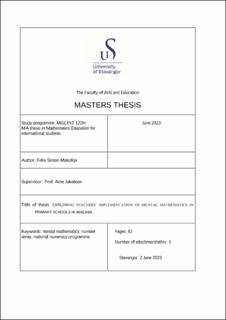| dc.description.abstract | The purpose of this study was to explore the teaching of mental mathematics in Malawi's lower
primary schools. The Malawi government has included mental mathematics in the National
Numeracy Program (NNP) curriculum for lower primary school learners. The aim is to provide
learners with mental mathematical knowledge and skills that would provide a solid foundation for
future mathematics study in primary schools. However, while the introduction of mental
mathematics in lower primary schools appears to be a solution to improve learners’ performance in
mathematics performance, more research is needed to determine how primary teachers teach mental
mathematics. The purpose of this study was to explore how mathematics teachers plan, teach and
view mental mathematics in Malawi primary schools. The sample was drawn from NNP pilot
primary schools, particularly in lower primary schools (standards 1–4), where mental mathematics
is introduced in the NNP curriculum. The study used the Mathematical Discourse in Instruction
(MDI) framework and was directed by the key research question "How do teachers in primary
schools piloting the NNP curriculum view mathematics?" This main research question was
supported by the following three subquestions: (1). How do teachers plan mental mathematics?, (2).
How do teachers teach mental mathematics?, and (3). what are the teachers' views on mental
mathematics?
The study included twelve teachers from three primary schools in Malawi's rural Eastern region.
The study is qualitative research that used interviews with teachers, lesson observations, and
document analysis (lesson plans) to collect data.
The study findings show that including mental mathematics in the curriculum in lower primary
schools is beneficial since it enhances learners' mathematics performance. It was established that
teachers rely on teachers' guides and learners' workbooks for guidance on how to select the tasks
and teach mental mathematics and that they have the autonomy to select and prepare their mental
mathematics problems depending on the day's work. Based on the findings, the study indicates that
mental mathematics may be a positive development because it helps learners build critical thinking
abilities and number senses | |
